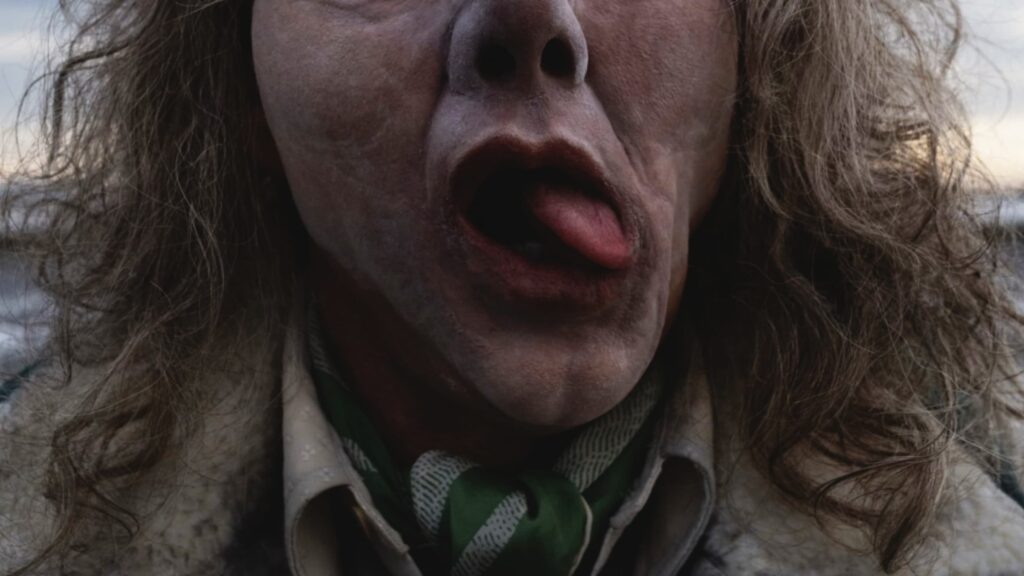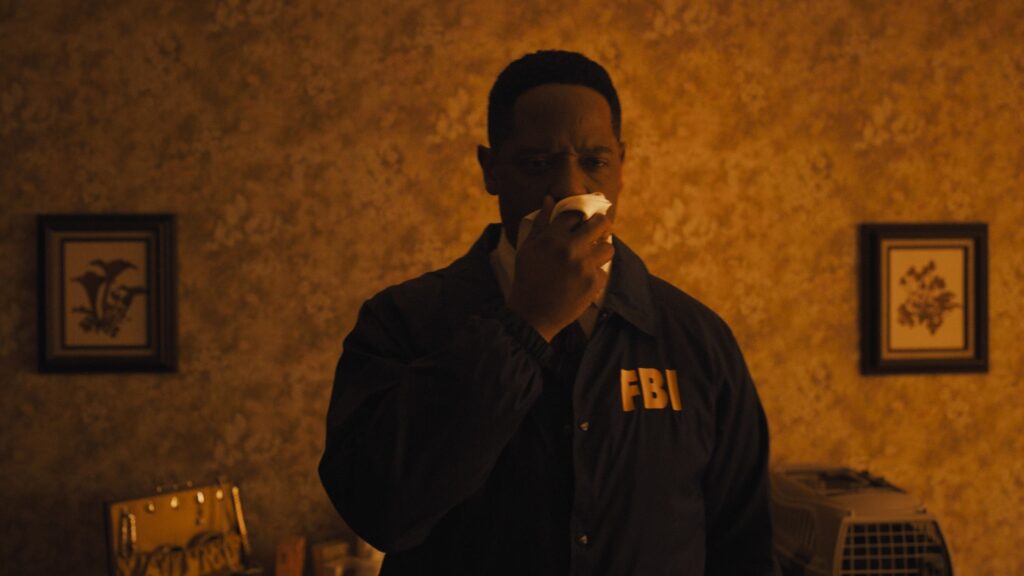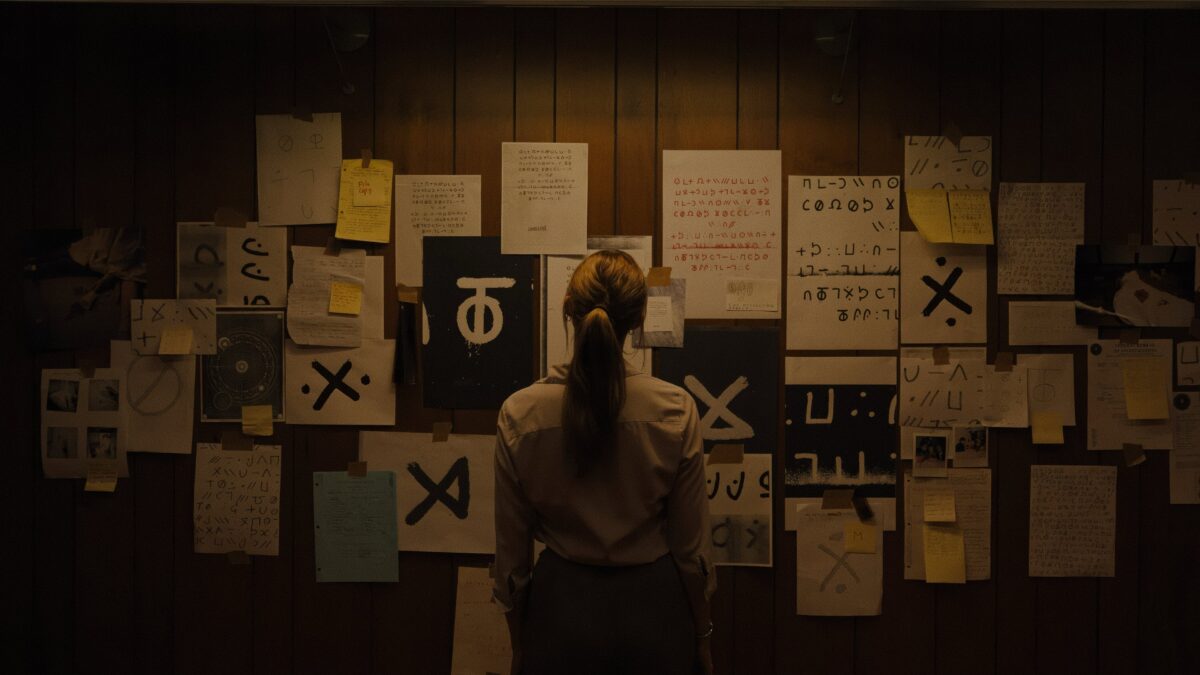Pholcidae doesn't have the same ring
There are certainly some things about Longlegs that I like. Unlike most crime thrillers, it opens at a full trot. Agent Lee Harker (Maika Monroe) is deep into chasing the titular serial killer by minute 6 of the runtime, and that includes a prologue and a title card sequence. The familiar beat of the hero detective stumbling upon the killer and narrowly avoiding death happens just a few minutes later rather than at the midway point or near the climax like you normally see in the ’90s serial killer flicks this is inspired by. And then she crosses paths with killer again within another 15 minutes. Danger is in the air from the start, and the creepy tension never entirely subsides for Longlegs’ mercifully short 100 minutes.
The film’s mood is also deeply unsettling, and that is worth something. It is uncommon for a movie to rattle me these days, and while I wouldn’t say Longlegs really rocked me, I did sleep pretty poorly with some dark dreams the night after I watched it. Some of what I dislike about the film ends up circling back towards a positive if you love horror: the unnerving uncanniness of the writing and acting, combined with the monotonous coloring and lighting, is like taking a shot of 151 directly into the subconscious.

But Longlegs is a pretty big disappointment, bordering on a catastrophe. Like Barbarian from two years ago, I’m stuck on the outside of an indie horror movie sensation partially for reasons I can articulate but partially because I’m not in tune with its vibes. Hell, maybe it goes deeper than that: Maybe I require more than vibes from my thrillers. Whereas I’m happy to just chill with a comedy or light drama, I demand structure and craft if you’re going to suck me into a dark mystery and drag me along in suspense.
Some of the building blocks of Longlegs, written and directed by Osgood Perkins, are also used in We’re All Going to the World’s Fair: A creepypasta aesthetic where uncanniness and quasi-reality are the root of the unease: The sense that the world that we’re looking at is not quite right, not quite human. The story logic doesn’t operate rationally, but in the manner of a half-waking dream. In World’s Fair, that distortion is captured on laptop screens and is very much the point. There, it is in service of a noodling character study with flashes of creepiness rather than an outright crime-thriller-horror yarn, and it gives the movie purpose. But in Longlegs, this pseudo-dreamy tone and look are an outright detriment, the result of flailing writing and repetitive production.
The story follows Harker’s investigation of Longlegs (Nicholas Cage), and before long, that splinters into a second case of deducing Longlegs’ accomplice. Perkins takes a cue from The Silence of the Lambs and keeps its villain regularly onscreen for very tiny intervals so his presence is felt but is never too familiar. Cage’s makeup and prosthetics are totally inhuman, halfway between Jigsaw and Jeff the Killer, always sickening and unnerving. And you probably don’t need me to tell you that Cage goes all in to being a deranged freak. Sometimes I worry I take Cage for granted, so I try to appreciate his face-melters when I can, and that certainly applies in Longlegs.

Harker is paired with the more seasoned Agent Carter (Blair Underwood). Their investigation is built around Harker’s “intuition” — a psychic connection she has with the case that is mostly forgotten after the first act when a parallel explanation for her understanding of Longlegs’ behavior is provided: that Harker has a past experience, perhaps repressed, with the murderer.
The investigation unspools into an increasingly opaque and unsatisfying satanic conspiracy. Its third act twist is so coincidental and contrived it makes Incendies‘ last half hour look tame. And it’s all presented in a slow, obtuse, quasi-coherent storytelling mode that I’m sure Perkins intends to be dreamlike but just seems ChatGPT-generated. Not helping matters is Monroe’s bizarre performance and line delivery, robotic and meek in a way that conveys as neurodivergent, or perhaps as a pull-string doll.
The production is no better than the story: Perkins has made a hell of a choice by soaking everything in putrid, dim yellow light, as if the film itself is infected. I appreciate that it presents a coherent aesthetic, but I really wish it didn’t make me feel like my eye was leaking pus for minutes at a time. I suppose it adds to the sense of a decaying reality, but it’s monotonous and grating.
 All in all, Longlegs is a major miss for me. It’s got enough creepy mood to leave an impression if that’s all you’re here for. But it falls apart more and more as the runtime progresses and the story spins to nonsense oblivion.
All in all, Longlegs is a major miss for me. It’s got enough creepy mood to leave an impression if that’s all you’re here for. But it falls apart more and more as the runtime progresses and the story spins to nonsense oblivion.
Is It Good?
Not Very Good (3/8)
Dan is the founder and head critic of The Goods. Follow Dan on Letterboxd. Join the Discord for updates and discussion.


2 replies on “Longlegs (2024)”
Yeah, this one felt pointless and inert to me. The jump scares were easy to anticipate, and the third-act turn to the supernatural was half-baked. (Though to be fair, it’s possible I was too preoccupied by the fact that Maika’s whole look/hairstyle/mannerisms strongly recalled an ex-girlfriend of mine. That was as unnerving as anything in the actual story.)
A big problem is that Cage just wasn’t scary or resonant for me. He always felt like a theater kid doing a bit, rather than an actor actually portraying a character. I’m not a Cage hater at all, but that does happen with him sometimes.
“I did sleep pretty poorly”
I had something of the opposite reaction, at least in the middle of watching it.